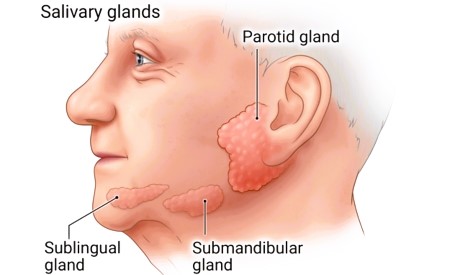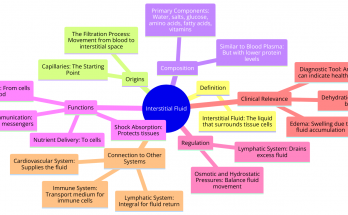The Salivary glands play a crucial role in maintaining oral health and aiding the digestive process. There are three major pairs of salivary glands in the human body –
- Parotid Glands-
- Largest salivary glands located in front of the ears.
- Submandibular Glands –
- Positioned below the jawbone.
- Sublingual Glands-
- Situated under the tongue.
Each of these glands has specific functions and contributes to overall oral well-being.
Functions of Salivary Glands
Saliva Production
- The salivary glands together produce about between 0.5 and 1.5 liters of saliva per day. The amount of saliva produced varies depending on factors such as diet, fluid intake and stress. Saliva is a clear, watery fluid that contains important components such as water, mucus, enzymes and antibodies.
Digestive Function
- Saliva is an important component of the digestive system. It helps break down food by moistening it and coating it with enzymes that initiate the breakdown of starch. The enzymes in saliva, especially amylase, convert starch into sugar, which can then be absorbed by the body during digestion.
Moisturisation and Lubrication
- Saliva helps maintain moisture in the mouth and throat, making activities such as swallowing and speaking easier. It keeps the oral cavity and throat lubricated, ensuring smooth movement of food through the digestive tract.
Protection against Infection
- Saliva contains antibodies that contribute to the body’s defence system by helping to fight off infections in the mouth. These antibodies help protect the mouth from harmful bacteria and viruses and reduce the risk of oral infections and tooth decay. In addition, saliva acts as a natural cleanser that washes away food particles and bacteria from the teeth and gums.
Taste Sensation
- Saliva plays an important role in the perception of taste. It dissolves food particles and enables the taste buds on the tongue to accurately detect flavours. Without sufficient saliva, taste sensation would be significantly impaired.
Speech Support
- Saliva helps with speech by moistening the vocal cords. This lubrication helps the vocal cords move smoothly, allowing for clearer and more effortless speech.
Forming a bolus to swallow
- Saliva helps bind the food particles and form a compact mass called a bolus. This bolus supports the swallowing process and makes it easier and more efficient.
Maintaining Oral Health
- Saliva contributes to oral hygiene by cleaning the mouth and reducing the number of harmful bacteria. This cleaning action helps prevent tooth decay and gum disease.
Water Balance in the Body
- Saliva helps in maintaining water balance in the body. Dryness in the mouth resulting from reduced saliva production triggers a feeling of thirst, which prompts people to replenish the body’s water balance.
Also Check – What is the role of Saliva in the Digestion of Food?
Also Check – What is the function of Digestive Enzymes?
Also Check – Nutrition in Human Beings
Also Check – Digestive Glands – Definition , Types and Functions


5 Comments on “9 Important Functions of Salivary Glands”